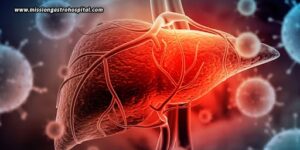
Remember how COVID-19 turned our lives upside down — with masks, lockdowns, and social distancing becoming commonplace? Now, in 2025, years after the long struggle, life has returned back to normal, isn’t it? We are back to attending schools, working in offices, traveling, and exchanging handshakes. However, although the pandemic has officially concluded, its lingering effects continue to manifest in our bodies. One organ that still carries the hidden weight of this viral onslaught is the liver!
While COVID-19 was initially classified as a respiratorydisease, it quickly became apparent to healthcare professionals that the virus had extensive repercussions across various organ systems, and the liver was one among them. In the blog below, let’s delve into what we have discovered regarding the liver’s role in COVID-19, particularly in cases of long COVID, and why it remains essential to monitor liver health after infection, even today.
The liver-COVID connection
During the early phases of the pandemic, many COVID patientsexhibited elevated liver enzymes like ALT and AST. These indicators of liver inflammation were often dismissed as temporary or secondary effects. However, as time progressed, a discernible pattern emerged. Patients with no prior liver issues began to develop new liver-related complications. Additionally, those with existing liver conditions experienced exacerbations or worsening symptoms.
We now recognize that COVID-19 can impact the liverthrough:
- Direct viral invasion via ACE2 receptors onliver and bile duct cells
- Inflammatory response — the notorious cytokinestorm
- Hypoxia or low oxygen levels due to respiratorydistress
- Drug-induced liver injury, resulting fromCOVID-related medications
- Pre-existing metabolic conditions worsened bythe virus
These interactions underscore the complexity of the virusand its capacity to induce liver stress, even after respiratory symptoms have subsided.
Who is at greater risk for post-COVID livercomplications?
Certain individuals are more susceptible to livercomplications following COVID-19.
- Individuals with existing liver conditions
- Those who experienced moderate to severeCOVID-19 infections
- People who received multiple treatments likeantivirals, steroids, and antibiotics
- Patients with diabetes, obesity, or metabolicsyndrome
- Individuals suffering from long COVID symptomsthat persisted beyond 12 weeks
If you belong to any of these groups, it is highlyrecommended to have regular follow-ups with liver function tests, even if you feel absolutely alright.
Symptoms you should not overlook after COVID
Liver damage can often occur without noticeable symptoms,but after COVID, you should be alert for signs such as:
- Persistent fatigue
- Nausea or decreased appetite
- Discomfort in the right upper abdomen
- Yellowing of the eyes
- Dark urine or light-coloured stools
- Itchy skin
- Elevated liver enzymes detected in routine bloodtests
Even mild symptoms, particularly when coupled with a historyof COVID-19, may require further investigation.
Where to go with the symptoms?
Even though the COVID-19 pandemic is now behind us, itseffects linger — particularly concerning internal organ health. This highlights the increasing importance of liver professionals and specialized liver hospitals. Liver specialists are well-versed in the distinct post-viral effects and provide –
- Comprehensive care for long COVID symptoms
- Nutritional guidance and emotional support
- Evaluations for liver transplants, if severedamage is present
- Continuous monitoring for patients withhigh-risk profiles
Selecting a reputed hospital, one like Mission GastroHospital, guarantees that subtle symptoms are not overlooked, ensuring your treatment is both personalized and comprehensive. With access to a top-tier liverspecialist in Ahmedabad, Mission Gastro Hospital offers advanceddiagnostics, compassionate care, and tailored liver treatment plans. It stands as a trusted choice for those seeking expert evaluation and long-term liver health support.
The good news – Liver recovery is possible
Despite the scare, there is good news! The liver is anincredibly resilient organ with an extraordinary ability to recover. With appropriate care, lifestyle changes, and timely intervention, many post-COVID liver complications can be effectively managed or even reversed. Some steps you can take to maintain a healthy liver or even help your liver recover include –
- Maintaining an active lifestyle – Regularphysical activity helps reduce liver fat and inflammation.
- Consuming liver-friendly foods – Focus ongreens, fruits, lean proteins, and whole grains, while steering clear of excessive sugar, saturated fats, and alcohol.
- Ensuring proper hydration – Adequate hydration,may it be water, or other healthy juices, facilitates liver detoxification.
- Avoiding unnecessary medications – Taking toomany unnecessary medications, particularly high doses of pain relievers, can damage the liver, so it’s better to steer clear of them as much as possible.
COVID-19 may not be making headlines anymore, but itslingering effects are still manifesting in the body – quietly, subtly, and at times, perilously. The liver, frequently neglected during the recovery process, warrants further attention. Whether you experience elevated enzymes, ongoing fatigue, or vague discomfort, it is crucial to heed your body’s signals. If you have had COVID-19 and still feel “off”, it may be wise to undergo a comprehensive liver health evaluation. With prompt detection, lifestyle modifications, and expert assistance from a specialized liver hospital, your liver can regain its optimal function, enabling you to truly move on from the pandemic, once and for all.